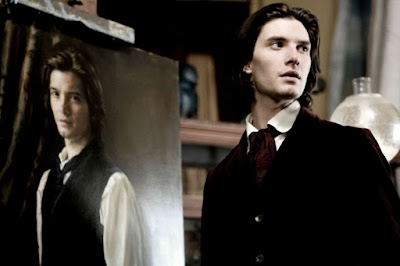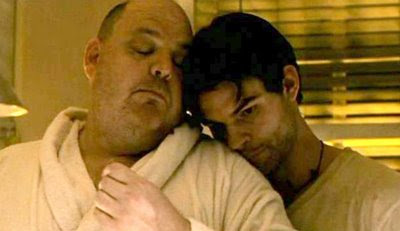Dorian Gray Delivers Few Chills and Even Less Thrills
I had to resist the urge to name this post Snore-ian Gray or Bore-ian Gray, but this film, by any other name, would be as bad. With agonizingly slow pacing, poor dialogue and an utter lack of tension Dorian Gray falls far short of its literary and filmic predecessors.
Dorian Gray is the story of a young man who has is portrait taken by artist Basil Howard. Under the influence of Lord Henry Wotton, Dorian comes to embrace the “art for art’s sake” aesthetic lifestyle that preaches sensation over morality. When confronted with his beautiful portrait he wishes that he will remain always beautiful while his portrait bears the brunt of time and sin. In Oscar Wilde’s version, Dorian indulges in a life of hidden debauchery causing his portrait to age and decay until Basil discovers Dorian’s secret and Dorian murders him. It ends with a cataclysmic showdown between Dorian and his painted soul.
In this film, Ben Barnes strikes a less than compelling caricature of the eternally beautiful young man with a black soul. His pretty face fulfills the surface of the role, but he lacks the emotional depth the tortured character of Dorian requires. This is in spite of the movie’s efforts to build sympathy for him using a past filled with abuse at the hands of his guardian.
For being film based on a book renowned for its verbal wit, Dorian Gray is an incredibly quiet film. This is not the kind of quiet that builds suspense, but more like the utter lack of sound that can put you to sleep. The dialogue does little to fill in this gap. Conversations between characters lack the fire of Wilde’s acid wit and are carried out in hushed tones in drawing rooms and brothels. Even scenes that should be naturally dramatic, like when Sybil begs Dorian not to leave her ruined, fall flat with no emotion. Wilde’s deliciously witty lines are delivered by Harry (Colin Firth) with a flat affect and left to float like lead balloons as the scenes trudge on endlessly. Composer Charlie Mole’s score does what it can, but comes off as an accompaniment of dull elevator music to even duller dialogue.
The movie also leaves nothing to the imagination. The depraved acts of Dorian Gray, only hinted at in the book, are given the full frontal treatment. Opium –fueled orgies, sadomasochism, bloodletting and homosexual liaisons (including one between Dorian and Basil) are all laid bare to the viewer. Far from titillating or shocking the audience, this strategy turns the movie into something like a soft core porno with brief narrative breaking up the juicy parts.
The death of Basil early on also derails the film’s dramatic tension. In the novel it is Basil, the artist searching for the truth, who forces Dorian to become unhinged and reveal his secret. This confrontation ends in Basil’s murder which then leads to Dorian’s self-murder at the end of the book. In the film, so much time lapses between the murder and Harry’s half-cocked detective work that any fear of discovery evaporates.
This movie is good if you have an afternoon to kill and want to see a pretty boy engaged in some risqué fun, otherwise I would pass.
Dorian Gray is the story of a young man who has is portrait taken by artist Basil Howard. Under the influence of Lord Henry Wotton, Dorian comes to embrace the “art for art’s sake” aesthetic lifestyle that preaches sensation over morality. When confronted with his beautiful portrait he wishes that he will remain always beautiful while his portrait bears the brunt of time and sin. In Oscar Wilde’s version, Dorian indulges in a life of hidden debauchery causing his portrait to age and decay until Basil discovers Dorian’s secret and Dorian murders him. It ends with a cataclysmic showdown between Dorian and his painted soul.
In this film, Ben Barnes strikes a less than compelling caricature of the eternally beautiful young man with a black soul. His pretty face fulfills the surface of the role, but he lacks the emotional depth the tortured character of Dorian requires. This is in spite of the movie’s efforts to build sympathy for him using a past filled with abuse at the hands of his guardian.
For being film based on a book renowned for its verbal wit, Dorian Gray is an incredibly quiet film. This is not the kind of quiet that builds suspense, but more like the utter lack of sound that can put you to sleep. The dialogue does little to fill in this gap. Conversations between characters lack the fire of Wilde’s acid wit and are carried out in hushed tones in drawing rooms and brothels. Even scenes that should be naturally dramatic, like when Sybil begs Dorian not to leave her ruined, fall flat with no emotion. Wilde’s deliciously witty lines are delivered by Harry (Colin Firth) with a flat affect and left to float like lead balloons as the scenes trudge on endlessly. Composer Charlie Mole’s score does what it can, but comes off as an accompaniment of dull elevator music to even duller dialogue.
The movie also leaves nothing to the imagination. The depraved acts of Dorian Gray, only hinted at in the book, are given the full frontal treatment. Opium –fueled orgies, sadomasochism, bloodletting and homosexual liaisons (including one between Dorian and Basil) are all laid bare to the viewer. Far from titillating or shocking the audience, this strategy turns the movie into something like a soft core porno with brief narrative breaking up the juicy parts.
The death of Basil early on also derails the film’s dramatic tension. In the novel it is Basil, the artist searching for the truth, who forces Dorian to become unhinged and reveal his secret. This confrontation ends in Basil’s murder which then leads to Dorian’s self-murder at the end of the book. In the film, so much time lapses between the murder and Harry’s half-cocked detective work that any fear of discovery evaporates.
This movie is good if you have an afternoon to kill and want to see a pretty boy engaged in some risqué fun, otherwise I would pass.






Softcore porn is fine with me -- I'm glad they depicted the homoerotics of the novella -- but "quiet"? Oh dear. Wilde adaptations should never be quiet! The trailer was enough to put me off, but I was still intrigued - glad you watched it for me. ;)
ReplyDeleteIt's my job triple-G
ReplyDeleteI have to admit I loved the film's homoeroticism. Basil gives Dorian a BJ! Oh my! Did it suddenly get warm in here?
Also check my Facebook for a juicy Journal of Dracula Studies Call for Submissions!